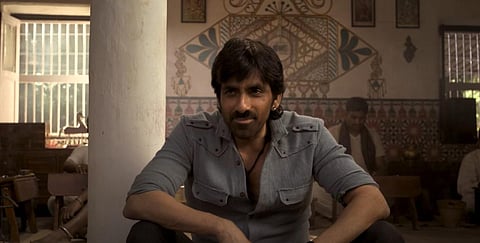

Early on in the film, the children of Stuartpuram are seen training as thieves under the guidance of their town’s honorary Dronacharya, Gajjala Prasad (Nasser). In order to endure hours of physical activity, they are made to drink donkey’s blood. There is also another scene showing how a child slaughters his own father, nay, beheads him. Thievery is a way of life here and these former inhabitants of a jungle are also displayed as the living receptacles of the law of the jungle. What’s meant to be yours cannot be earned, only grabbed. It is in this world that Tiger Nageswara Rao is born and bred, growing up to be a legendary Robin Hood archetype, whose myth will live long after he passes on. With a star like Ravi Teja at the helm of this story, it is easy to assume that the film will largely be centred on his ascent and accession — but here is where the story of Tiger Nageswara Rao throws its googlies, which makes the story worth our time, despite a fair amount of shortcomings.
It is hard not to shake off the KGF déja vu when the film starts with IPS Vishwanadh Sastry (Murali Sharma) rushing off to Delhi to narrate the tale of Nageswara Rao’s exploits to a bunch of high-ranking security and intelligence officers. The film’s sepia-tinted frames (it is set mostly in the 80s), only add on to the said déja vu. Thankfully, this is short-lived. After quickly showing us how Nageswara alias Nagi finds his footing among the power brokers of Stuartpuram, we quickly move on to his love story. While Ravi Teja’s films are always known to have him play an unscrupulous lothario who is infamous for striking women long before a certain Arjun Reddy entered the scene, such sub-plots were always brushed off as masala cinema, as essentially Ravi Teja cinema.
Here, his interactions with women feel a lot more unhinged, and frankly, unnecessary, amidst all the bigger fish the film aims to fry. Tiger Nageswara Rao feels like it wants to be more than a star vehicle and yet it brings back the not-so-good elements of a Ravi Teja film and how! Despite the jarring element of having a protagonist who is known for patronising brothels — a detail most heroes do not have in their backstories for obvious reasons — Nagi’s relationship with Sara (Nupur Sanon) is the exact kind of romantic sub-plot we have seen in so many films, it makes one wonder why filmmakers in 2023 even bother going the distance and making a masala film with a period backdrop and other new-age hijinks. Nagi is no good man, but the film is quick to suggest that one who can put up a fight against a much worse man, automatically earns himself a distinction of being a good man. At least that is the takeaway you think you would be taking along with you before you reach the second half.
After a somewhat unconvincing subplot involving a former prime minister, you get a more typical retelling of events in the latter parts of the film. The retelling in itself deserves due emphasis, for it manages to drive home something more interesting than Tiger’s personal journey itself. There is some heartfelt messaging about discrimination meted out against denotified tribes, the importance of education, and the necessity to opt for legitimate ways of living (running a tobacco factory over committing robbery). Versions of a story as narrated by Vishwanadh Sastry get counter-narrations from Gajjala Prasad. The film is so committed to its stance against the perils of misunderstanding, that even the tragic death of Tiger Nageswara Rao is carried out due to misunderstandings. A larger set of misunderstandings the film brings upon itself is in its punishingly loud background score and cramped visual aesthetics that distance the film from its audience, while relegating large parts of its narrative to generic territory — which is ironic, considering the film wants to be anything but that. So, what gives? Can a man be good and bad? While filmmakers have been trying to figure out the answer to this question through their anti-heroes for decades, the answer to what might be good or bad cinema might be just as elusive sometimes.
Cast: Ravi Teja, Sudev Nair, Nasser, Anupam Kher, Nupur Sanon, Gayatri Bhardwaj, Renu Desai, Kancherapalem Kishore
Director: Vamsee